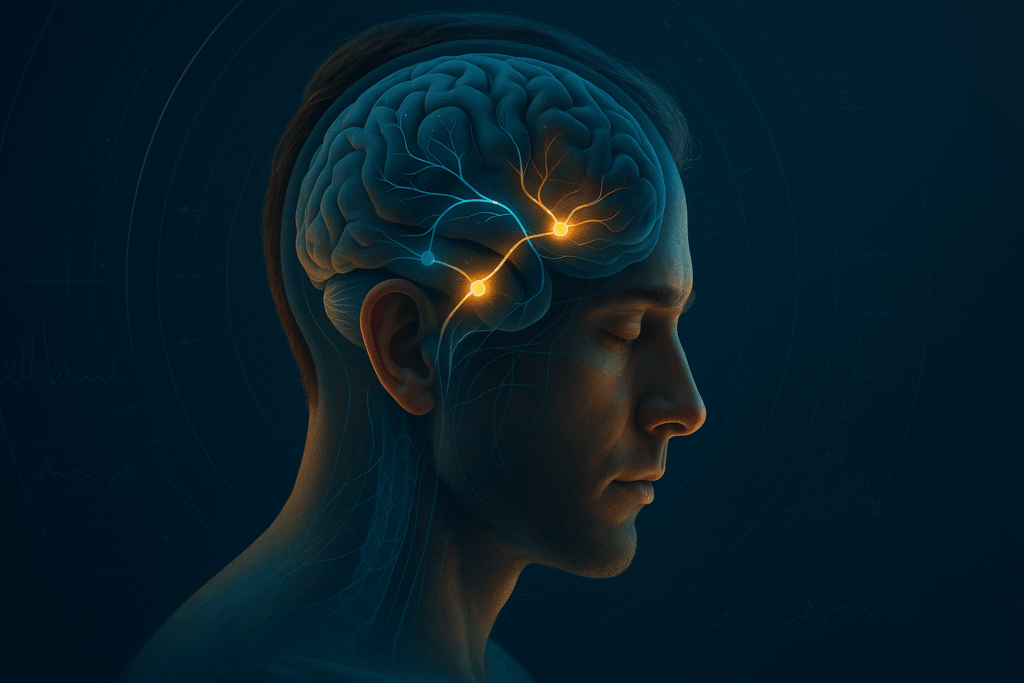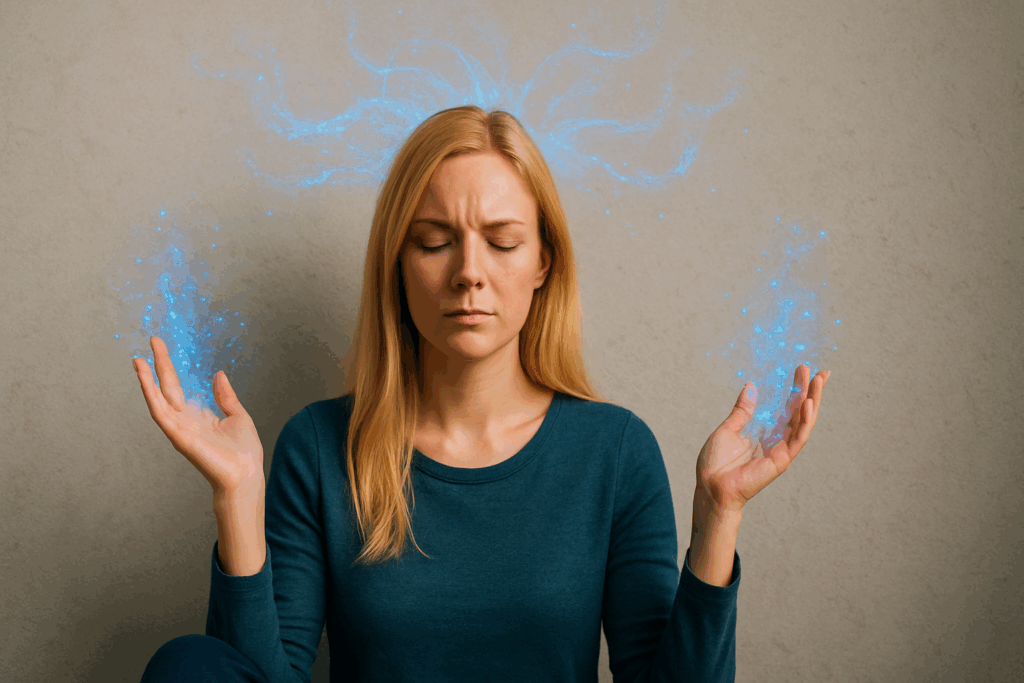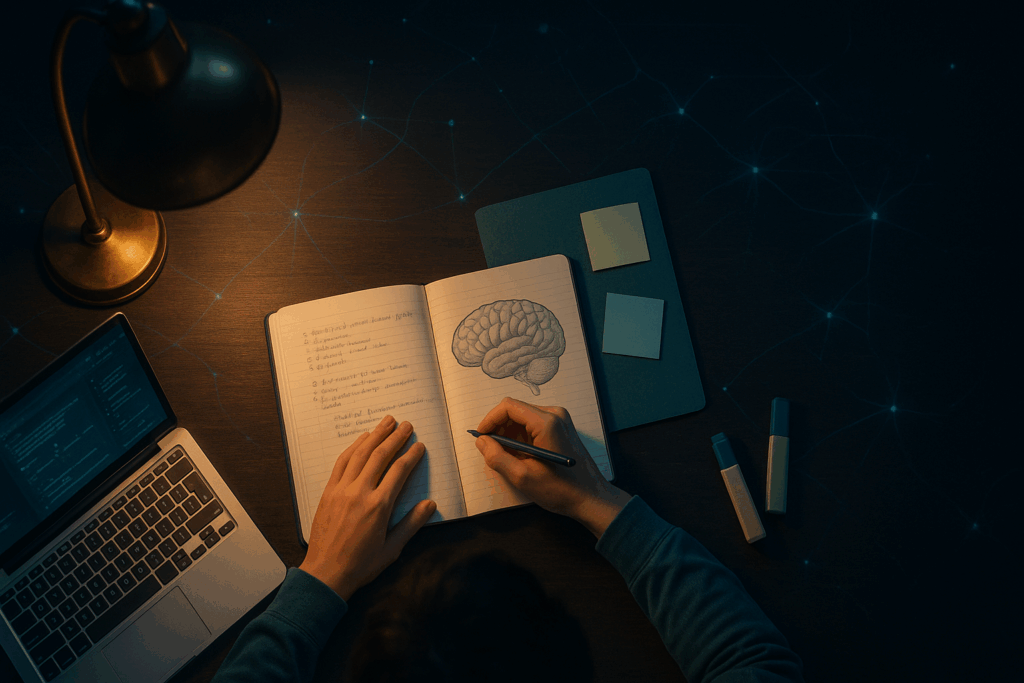🎧 Audio Version
The Quiet Revolution
Precision dopamine signaling is quietly reshaping how we understand brain function, motivation, and high-level performance. For years, dopamine was considered the brain’s broad “feel-good” chemical, involved in almost everything from risk-taking to habit loops. Today’s research provides a more precise understanding: dopamine acts precisely in the brain, delivering its effects in rapid, targeted bursts known as dopamine hotspots. This revolution is fueling new tools for brain optimization, from executive performance coaching to next-generation therapies for mood, focus, and neuroplasticity.
Advancements in precision dopamine signaling are expanding the potential for mental clarity, motivation, and resilience. As neuroscience reveals how dopamine shapes everything from willpower to recovery, the path to purposeful change is entering a new era. For high achievers, leaders, and anyone seeking an edge in mood and motivation, these insights offer a powerful toolkit that translates directly into daily results.
This deep dive into precision dopamine signaling will guide you through the science, real-world applications, and practical steps for unlocking your brain’s hidden potential. Discover why dopamine is no longer just a headline; it’s the key to personalized, targeted, and sustainable brain optimization.
From Floodlight to Spotlight: The Evolution of Dopamine Science
For decades, dopamine was viewed as the brain’s universal motivator, delivering a sweeping wave of pleasure and reward across neural circuits. Early neuroscience framed dopamine as a floodlight, its effects washing over wide areas and shaping everything from mood to movement in broad strokes. This model powered much of our early understanding of motivation, addiction, and even learning.
But the last few years have triggered a seismic shift in this perspective. New imaging and genetic mapping techniques have shown that dopamine works in a more complicated way: it works like a spotlight instead of a floodlight. Rather than exerting its influence universally, dopamine selectively targets specific brain “hotspots” at precisely the appropriate moment. Cues, decisions, and moments of peak attention rapidly activate these dopamine hotspots, shaping behavior in far more nuanced ways than previously imagined.
This paradigm shift isn’t just academic. The shift from broad signaling to precise dopamine activity is already influencing how experts create brain optimization strategies, develop targeted therapies, and coach executive performance. The science of dopamine now focuses on pinpointing the precise moments, triggers, and brain circuits that significantly impact performance. As we uncover these pathways, the potential for sustainable change and peak performance is set to explode.

What Are Dopamine Hotspots? Precision Signaling Explained
Dopamine hotspots are the brain’s new frontier for understanding motivation, learning, and behavioral change. Rather than being released everywhere at once, dopamine now appears to surge in carefully chosen micro-zones, targeting specific neural pathways linked to particular thoughts, actions, and emotional states. These precision-driven signals allow the brain to reinforce exactly the behaviors or decisions that need attention, enabling rapid adaptation and highly specific learning.
The discovery of dopamine hotspots has revolutionized conventional wisdom. These areas light up instantly in response to certain cues, such as rewards, new challenges, or moments of decision—and then quickly fade away. This quick, localized action means the brain can optimize energy, sharpen focus, and regulate mood with far greater sophistication than a blunt, widespread “feel-good” effect. In practice, such behavior means our most meaningful changes, habits, and breakthroughs often come from focused bursts of dopamine activity rather than an all-over surge.
Applied neuroscience now uses this targeted approach: by focusing on specific areas that release dopamine with certain methods, we can improve mental flexibility, recover faster from difficulties, and maintain better performance. The science is clear: unlocking these micro-bursts is the secret ingredient to lasting brain optimization.
Precision Dopamine and Neuroplasticity: How Change Really Happens
Dopamine plays a big role in how our brains learn and grow. Neuroplasticity is the brain’s way of changing its connections when we learn something new or practice new habits. Previously, scientists believed that numerous chemicals dispersed simultaneously caused these brain changes.
Now, scientists know that dopamine works in smaller, more focused ways. Instead of affecting the whole brain, dopamine shows up in certain spots and helps make new brain connections just where they are needed. These short bursts of dopamine help us pay attention, learn faster, and remember things better.
This discovery helps explain why some new habits stick and others don’t. When we get a quick boost of dopamine at the right time and place in the brain, it becomes easier to build new skills or make lasting changes. This is excellent news for anyone who wants to grow, learn, or recover, because it means there are now clearer ways to help the brain change in a strong and healthy way.
Turning Precision Dopamine Signaling Into Real-Life Habits
Precision dopamine signaling is not just something that happens in a lab. It can help explain why some goals or habits are easier to keep than others. When dopamine moves to just the right spot in your brain, it helps you feel positive about taking action. This makes it much easier to stay motivated and build strong habits over time.
Imagine you want to study better, work harder, or even eat healthier. When your brain releases dopamine in the areas that control focus or willpower, you get a small reward feeling that pushes you to keep going. This is what makes learning and positive change feel satisfying. Instead of waiting for big rewards, your brain gives you tiny boosts each time you make the right choice.
You can use this understanding to shape your day. Breaking big goals into smaller steps helps your brain release more frequent and targeted dopamine bursts. Simple wins and small habits, like drinking water when you wake up or finishing a short task, give your brain the chance to reward itself. Over time, these small actions build new brain pathways through precision dopamine signaling, turning short bursts into long-term success.

Simple Ways to Boost Brain Power With Precision Dopamine Signaling
You This approach can enhance your brain’s function by utilizing what scientists understand about precision dopamine signaling. The goal is to help your brain release dopamine in just the right place at just the right time. This strategy makes it easier to focus, feel motivated, and take action, day after day.
Start by paying attention to small achievements. When you finish a short workout, solve a problem, or check off a task, your brain receives a quick reward. These moments are perfect for precision dopamine signaling. e The more you notice and celebrate these wins, even tiny ones, the more your brain learns to repeat them. Establish new habits that are straightforward and effortless, allowing your brain to acclimate to the positive emotions associated with change. Over time, each small step adds up and builds stronger, healthier brain connections.
Another tip is to create routines that make it easy to start habits. Try For example, putting out your workout clothes the night before or setting an effortless reminder for deep breathing or drinking water can help reinforce these habits. Each time you follow through, even with small steps, your brain uses precision dopamine signaling to make change easier. Consistency is key: the more often you practice, the stronger your new habits and brain connections become.
Boosting Learning and Memory With Precision Dopamine Signaling
Learning something new is easier when your brain is functioning optimally. ePrecision dopamine signaling helps your brain remember important information and build new skills. When your brain releases dopamine in exactly the right spot, you pay more attention, remember things faster, and feel positive about learning.
Each time you make progress or understand a new idea, your brain gives you a burst of dopamine. This process makes it more likely you’ll keep studying or practicing. e The more often this process occurs, the stronger your memory and skills will become. Decision dopamine signaling is like a coach in your brain, cheering you on every step of the way.
To get more of these dopamine boosts, stay curious and try new things. Additionally, ask them to explore topics that interest them and challenge themselves with small goals. When learning feels fun or intriguing, your brain uses precision dopamine signaling to help you remember more and do better next time.

Overcoming Stress With Precision Dopamine Signaling
Stress can make life feel tough, but precision dopamine signaling gives your brain a way to handle anxiety better. When you face a challenge, your brain can use precision dopamine signaling to target the right spots, helping you stay positive and bounce back.
Each time you solve a problem or take a step toward calming down, your brain can reward you with a quick burst of dopamine. This small reward helps you feel capable during stressful times. Precision dopamine signaling turns these little wins into stronger coping skills and builds up your resilience—the ability to recover after setbacks.
If you’re feeling stressed, try breaking your problems or worries into smaller pieces. Focus on solving just one thing at a time. Each solution can give your brain a boost with precision dopamine signaling. Over time, these small steps help your brain stay flexible and strong, making it easier to manage stress in the future.
Building Stronger Relationships With Precision Dopamine Signaling
Relationships and social skills can grow stronger thanks to precision dopamine signaling. When you connect with others, help a friend, or share a kind word, your brain gives you a burst of dopamine right where it matters most. This positive feeling encourages you to continue building good connections.
Every time you listen, show interest, or celebrate someone’s success, your brain practices using precision dopamine signaling. These moments of kindness and support are not just nice—they help your brain create stronger social pathways. Over time, the result makes it easier to trust, cooperate, and get along with others.
Simple habits like saying thank you, making eye contact, or giving a compliment can train your brain to use precision dopamine signaling in social situations. Even small acts of kindness add up. Day by day, you’ll feel better and become more confident in your ability to make positive connections.

The Science Behind Precision Dopamine Signaling
Precision dopamine signaling is not just a buzzword. It comes from new research that shows how dopamine works inside the brain. Using advanced brain scans and tracking technology, scientists can now see exactly where and when dopamine is released during different activities. This has indicated that dopamine is much smarter than we thought. Instead of spreading through the whole brain, it targets specific places to support learning, reward, focus, or movement.
This discovery has changed the way experts approach everything from addiction to personal growth. For example, understanding precision dopamine signaling explains why some people respond better to certain therapies, coaching styles, or new routines. It also points to why some goals feel satisfying and others don’t. In short, this science gives us a map of how the brain can be optimized for performance, motivation, and good habits.
By taking a closer look at where dopamine goes and when it gets released, experts can now develop better programs for health, recovery, learning, and emotional strength. This new science is not just for labs—it is for parents, teachers, athletes, business leaders, and anyone looking to feel and do better.
Technology, AI, and Precision Dopamine Signaling
Technology is now helping people better understand and use precision dopamine signaling for brain optimization. Smart apps, wearable devices, and even artificial intelligence can track habits, suggest routines, and reward small achievements that trigger precise dopamine release. These digital tools help users stay motivated, remember goals, and practice healthy actions every day.
Artificial intelligence is becoming a coaching partner for people who want to make real and lasting change. AI can learn what types of habits or rewards work best for each person and help shape positive routines in ways that keep dopamine signals working in their favor. For example, a fitness app might give points or encouragement at just the right time to boost your brain’s use of precision dopamine signaling.
These advances make it easier than ever to use brain science in daily life. By combining new technology and our growing knowledge of precision dopamine signaling, more people can reach their highest potential in a way that fits their unique needs and lifestyle.
When Precision Dopamine Signaling Goes Wrong
Precision dopamine signaling can help people thrive, but occasionally this system gets out of balance. Too much digital stimulation, like overeating, video games, or endless social media, can flood the brain with rewards that are too constant or strong. The brain gets overwhelmed and starts needing bigger dopamine hits just to feel normal. Everyday joys begin to seem dull, and only intense or nonstop excitement feels satisfying.
If someone doesn’t get enough opportunities for small wins or real-world rewards, precision dopamine signaling can slow down. This makes motivation drop and can leave a person feeling stuck or low. Getting the right balance is important for building healthy habits and enjoying regular life. Taking breaks from screens, setting goals with real meaning, and celebrating genuine achievements keep the brain’s dopamine system working well.
Understanding risks and practicing good habits resets the brain’s precision dopamine signaling. Energy and motivation return, and small, positive experiences start to feel rewarding again. Staying aware and intentional helps keep this system strong for long-term well-being.
Precision Dopamine Signaling and Relationships
Precision dopamine signaling shapes every important relationship. Whenever people share a laugh, help each other, or celebrate together, the brain sends dopamine to pathways for trust and empathy. These moments do more than make us feel good—they help build connections that grow stronger over time.
Neuroscience-based coaches teach clients to notice these brief, rewarding moments. Listening carefully, being generous, and celebrating small successes can light up the reward system. Repetition of these small victories facilitates the development of resilient and satisfying relationships. Coaches also use gratitude and positive feedback to boost connection, teaching habits that make communication easier and safer.
Over weeks and months, practicing these routines turns relationships into real sources of growth and joy. Precision dopamine signaling rewards honesty and kindness and helps solve misunderstandings, making strong bonds last.

Using Precision Dopamine Signaling to Reach Your Biggest Goals
Precision dopamine signaling makes a difference with big goals in life and at work. When the brain releases dopamine in small, focused bursts, attention sharpens, action becomes easier, and learning speeds up. Targeted dopamine signals help people repeat useful behaviors and stay on track.
Science shows dopamine helps the brain detect what goes well and what doesn’t. When success comes, precision dopamine signaling delivers a stronger reward, helping push a person to try again. This is key for mastering tough skills or working on dreams that take time.
By breaking goals into smaller milestones and celebrating each win, clients can trigger more precision dopamine signaling. This builds confidence, keeps motivation high, and protects against setbacks. Over time, the brain learns new habits and skills, making even big challenges feel manageable.
Understanding precision dopamine signaling brings fresh ideas to personal growth and brain coaching, putting better results within reach for anyone willing to use new strategies.
Frequently Asked Questions

u003cstrongu003eHow do I know if I’m using precision dopamine signaling to my advantage?u003c/strongu003e
You’re working with precision dopamine signaling if you break goals into small steps, celebrate quick wins, and notice boosts in focus, motivation, or satisfaction after those wins. When you feel a genuine sense of achievement for even simple actions, your brain is practicing healthy, targeted dopamine releases. Working with a neuroscience-based coach ensures you’re using methods proven to activate the brain’s reward pathways at just the right moments.
u003cstrongu003eIs this approach really successful for personal growth, or is it just hype?u003c/strongu003e
Precision dopamine signaling is backed by cutting-edge neuroscience. Research shows that small, well-timed rewards drive greater success with new habits, learning, and motivation. People who use these techniques—supported by expert coaching—are consistently more likely to form lasting habits and bounce back from setbacks, compared to those using broad, “one-size-fits-all” methods.
Can precision dopamine signaling help with serious challenges like addiction, ADHD, or trauma?
Absolutely. Studies reveal that restoring precise dopamine signaling is especially powerful for people dealing with addiction, ADHD, and PTSD. By learning new routines and celebrating daily progress, clients reset their brain’s natural reward system, making recovery and focus not only possible but also sustainable over time.
What’s different about working with a neuroscience-based coach versus regular coaching or self-help?
A neuroscience-based coach is trained to read your unique brain patterns and tailor interventions that work best for you. Instead of generic advice, you get customized strategies using scientific tools to trigger dopamine exactly when and where your brain benefits most. This approach helps you get results faster and more reliably than traditional, non-specialized methods.
How soon can I expect to see results from using these strategies?
Many people notice improvements in mood, motivation, or focus within days to weeks of using targeted dopamine practices. The more consistent you are with small, rewarding steps, the quicker your brain’s precision dopamine signaling strengthens. Long-term changes are even more robust when guided by a professional who ensures you stay on the right track.













